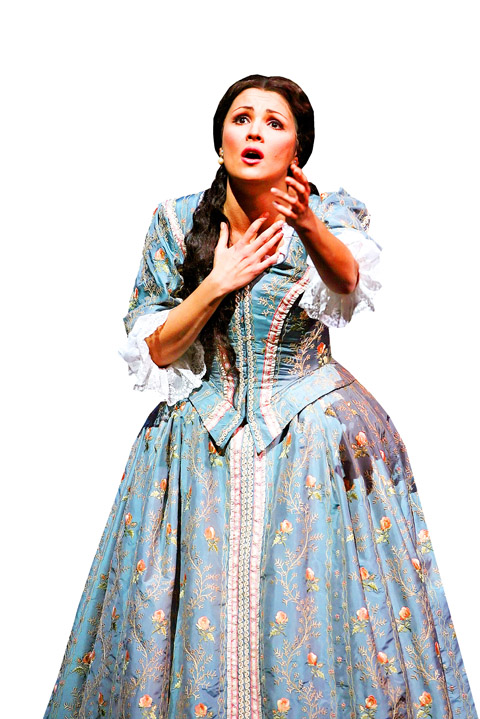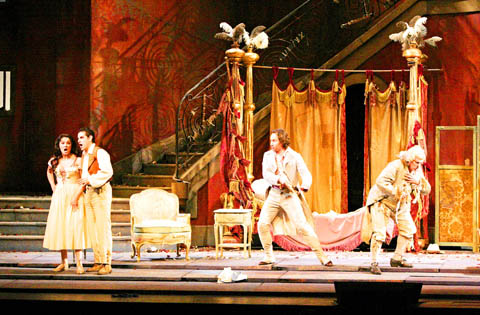When Anna Netrebko sang Violetta in London’s Covent Garden’s production of La Traviata in January, the critics — certainly the male ones — could have used sponges to soak up the drool from their keyboards. Not since Nicole Kidman’s performance in The Blue Room (described as “pure theatrical Viagra” by the man from the Telegraph) have reviewers come over quite so unnecessary.
“I thought your critics hated me,” says Netrebko in her diverting Russian accent, lowering her Jackie O shades. We’re in a terrace restaurant overlooking the gothic splendor of St Stephen’s cathedral in Vienna, where Netrebko lives. She stares at me with serene brown eyes, redolent of a more glamorous Sandra Bullock. “My reviews in London were always terrible.”
“It seems,” the soprano says, her voice dropping an octave, “that I conquered them.” And how. “Shaken, stirred and still quivering at the knees, I’m an altered man,” wrote the London Times’ Richard Morrison. The Observer’s Peter Conrad went further: “Now we all love her — and, not wanting to be outdone by the multitude, I personally adore her.” Amid such boystrionics, the Guardian’s Tim Ashley sounded almost downbeat in claiming the revival “may go down as one of the defining operatic experiences of our times.”

Single-handedly (with due respect to Jonas Kaufmann as Alfredo and conductor Maurizio Benini), Netrebko revivified Richard Eyre’s 1994 production of Verdi’s tragic opera about a consumptive demimondaine. “I didn’t like this production,” she says. “It’s so old-fashioned. Yes, it’s beautiful, but it needed life. I gave it some.” Netrebko is not Callas, but she exudes similarly pitiless self-assurance.
She brought the production to life partly by the way she shook Violetta to death: Netrebko’s throttled pianissimi and strangled spasms of coughing, both dramatic symptoms of the heroine’s fatal illness, made some fear she was imperiling what Conrad called “that lush, expensive throat of hers.” When she sang Morir si giovine (To Die So Young), there were tearful ovations. London hasn’t been as captivated by a Violetta since Angela Gheorghiu sang the role in 1994.
As a makeover artist, Netrebko is peerless. London is only the latest operatic capital to fall for the woman who last year appeared in Time’s list of the world’s most influential people. When she sang Bellini’s I puritani (The Puritans) at New York’s Met in 2006, she lay down onstage, dangling raven locks into the pit. That seems an odd position to sing some of opera’s most difficult coloratura passages. “I wanted to cancel,” she recalls. “Yes, the music was gorgeous, but the story? It’s like about nothing. I had to give it a wild interpretation.” New York, titillated by her 2002 performance as Natasha in Prokofiev’s War and Peace, duly succumbed.

Netrebko also knows how to leave fans with their tongues out, yelping for more. After the glowing reviews appeared for her Covent Garden performance in Traviata, she left London before her run was complete. “I had bronchitis, which is very serious for a singer. If you’re serious about being a coloratura soprano, you have to look after your voice, even if that means walking offstage during a performance.
“Particularly when you’re in my condition,” she adds, smoothing her hands over the bump in her Stella McCartney maternity dress. She is due to have a baby boy this autumn. “We have very strong muscles down there,” she announces. “It is easy for sopranos to give birth.” Surely that remains to be seen? “No, it will be an easy birth.” Memo to self: never contradict a diva in her second trimester.
The baby will be the son of a Russian soprano and a Uruguayan bass-baritone. Already he has heard more live arias than many people hear in a lifetime. “My husband [Erwin Schrott] has been singing at my belly.” What about you? “I must stop singing in June because it is very disturbing for him.” He might be loving it, I suggest. “Maybe.” Is she looking forward to motherhood? “I will only have six months away from singing. That’s enough. My career may be short — who knows? — but I don’t want to make it shorter.”

Can it really be true, I ask, that you fell for Schrott when you were Donna Anna to his Don Giovanni at Covent Garden last year? After all, he did sing half naked in a performance described by the New York Times (under the headline “Hey, Giovanni, put a shirt on. You’ll catch cold”) as “unabashedly narcissistic.” “Actually,” says Netrebko, fixing me coldly, “I met him four years ago, long before this performance. I liked him because he has a special charisma. We are married now and I don’t expect to sing with him very often again. It is too much for us to do this.” Too much, too, for audiences: a cocktail of sexy singing and partial nudity as heady as Netrebko (36) and Schrott (35) offer is rarely served even in opera houses.
Netrebko did share the stage with Schrott last month. They had been lured to Abu Dhabi for a gala concert held by oil-rich sheikhs as part of the United Arab Emirates’ cultural revolution in the desert. For all that her voice blazed on this odd evening (there were empty seats and the women singers were urged, unsuccessfully, to adhere to modest dress), I suggest this was an unappealing enterprise. “For me it was like a holiday,” she replies. “We had a lovely hotel, everybody was very kind and then we bought our wedding rings in Dubai.”
Despite marriage, Netrebko remains the object of sexual fantasies. It is just not true, I can reveal, that her ambition is to sing Strauss’s Salome while naked. “I never said that,” she says crossly. “They said this about me in — was it the Sun? [It was actually the Sunday Times] I have no desire to appear naked. The severed head [of John the Baptist] is enough, surely.”
She did, however, recently appear in Playboy’s Sex and Music issue, and in glossy magazine after glossy magazine she drapes herself obligingly in gamine and/or raunchy poses, as women classical musicians and opera singers in this glum era of commodified sexuality seem contractually obliged to do.
Ladies and gentlemen, Netrebko is a bundle of contradictions. She lets her hair down not just when singing Bellini in New York but by doing the can-can in St Petersburg nightclubs. If she were a storyline for an Italian opera, they’d reject her as implausible. For a start, she is officially both an ambassador for Chopard jewelry (whatever that amounts to) and for SOS Children’s Villages, which provides homes for abandoned and orphaned children.
She has two nationalities, Austrian and Russian. “I live just over there,” she says pointing past Vienna’s cathedral, “but I also keep a place in St Petersburg. For me St Petersburg is the city that I can never escape because it has this special energy, even a dark energy. It keeps pulling me back.”
Netrebko said her decision to live outside Russia for much of the year was prompted by visa difficulties. But that rejection of home angered some Russians. She has tried to build bridges, recording an album in Russian and planning a tour there. “Think of her,” said Newsweek, “as the Anna Kournikova of classical music, but with talent.”
She was born in Krasnodar, near the Black Sea, in 1971. She gets bored of denying the story that she was a cleaner at the Kirov opera in St Petersburg when the conductor Valery Gergiev made her an overnight star. The truth is she was a conservatory student who did some cleaning to earn money. Later she auditioned at the Kirov and Gergiev became her mentor, helping her make her debut as Susanna in The Marriage of Figaro and then developing her repertoire with Pamina in the Magic Flute and Lucia di Lammermoor. “I am still working on developing my voice,” she says. “I am, I know, better as a coloratura singer than I was. It’s a matter of strong breath control and yet making it sound as though it is the easiest thing in the world.”
Does she miss Russia? “I had a lovely childhood, but perestroika created hunger and crime and misery. These are still the biggest problems — the big industries closed down and in the provinces they have no jobs so they do nothing but drink vodka.” Her father, a geologist, and her mother, a telephone engineer, have been lucky.
But the biggest paradox of Netrebko’s life is that, despite the saucy photo sessions, she insists she is an artist of integrity. “I have no desire to become a crossover artiste, singing with microphones. I believe in opera; that it is something that young people would love if they had a chance to hear it.” Some clearly do: Netrebko’s CDs sell as well as Three Tenors discs did in their heyday.
Before she becomes a mother, she will captivate London once more. She will sing at the Classical Brits (awards ceremony), for which she is nominated as female artist of the year, on May 8. “I don’t know what I will sing, but it will have to be something wild for such a night.” Whatever it is, it will be sung by a fully-clothed woman. Probably in a maternity dress, possibly designed by Stella McCartney. Gentlemen reviewers, if you have more drool to shed, do it in private.

June 23 to June 29 After capturing the walled city of Hsinchu on June 22, 1895, the Japanese hoped to quickly push south and seize control of Taiwan’s entire west coast — but their advance was stalled for more than a month. Not only did local Hakka fighters continue to cause them headaches, resistance forces even attempted to retake the city three times. “We had planned to occupy Anping (Tainan) and Takao (Kaohsiung) as soon as possible, but ever since we took Hsinchu, nearby bandits proclaiming to be ‘righteous people’ (義民) have been destroying train tracks and electrical cables, and gathering in villages

Swooping low over the banks of a Nile River tributary, an aid flight run by retired American military officers released a stream of food-stuffed sacks over a town emptied by fighting in South Sudan, a country wracked by conflict. Last week’s air drop was the latest in a controversial development — private contracting firms led by former US intelligence officers and military veterans delivering aid to some of the world’s deadliest conflict zones, in operations organized with governments that are combatants in the conflicts. The moves are roiling the global aid community, which warns of a more militarized, politicized and profit-seeking trend

The wide-screen spectacle of Formula One gets a gleaming, rip-roaring workout in Joseph Kosinski’s F1, a fine-tuned machine of a movie that, in its most riveting racing scenes, approaches a kind of high-speed splendor. Kosinski, who last endeavored to put moviegoers in the seat of a fighter jet in Top Gun: Maverick, has moved to the open cockpits of Formula One with much the same affection, if not outright need, for speed. A lot of the same team is back. Jerry Bruckheimer produces. Ehren Kruger, a co-writer on Maverick, takes sole credit here. Hans Zimmer, a co-composer previously, supplies the thumping

Dr. Y. Tony Yang, Associate Dean of Health Policy and Population Science at George Washington University, argued last week in a piece for the Taipei Times about former president Ma Ying-jeou (馬英九) leading a student delegation to the People’s Republic of China (PRC) that, “The real question is not whether Ma’s visit helps or hurts Taiwan — it is why Taiwan lacks a sophisticated, multi-track approach to one of the most complex geopolitical relationships in the world” (“Ma’s Visit, DPP’s Blind Spot,” June 18, page 8). Yang contends that the Democratic Progressive Party (DPP) has a blind spot: “By treating any